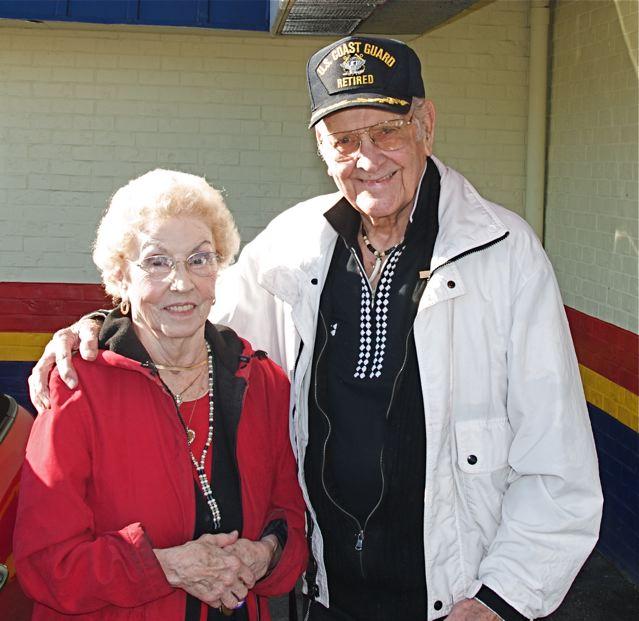Pretty black-haired girl, her hero together again
Elsie and Morey pose together.
Tue, 11/09/2010
At 25 Morey Skaret had already "rode the rods" to Wyoming and back. It was depression-era travel at its cheapest.
Riding under the boxcar on two-inch thick rods was considered the most dangerous aspect of hobo life but this young man from the prairies of Alberta, Canada was born with an indomitable spirit.
By 1938 Morey's first real job was with the Seattle Police Department. His first assignment; standing in the middle of 3rd and Union, directing traffic. Waving arms and standing as he did for a few hours, Morey felt the need to use a nearby restroom in the alley near the old Embassy Theatre.
"I finished my business and headed back to my intersection," Morey explained.
At this point he could not help but notice a fidgety man at the ticket window of the theatre. The perpetrator's hands and arms were in the pass through.
"He had his back to me but I could see him holding a gun pointed at the pretty black-haired girl behind the glass", Morey said.
Morey moved with the stealth of a cat to get up right behind the would-be thief as he was scraping cash inside the window glass. "I cocked my Smith & Wesson revolver and put it to the back of his head. "Move and I'll blow your brains out! You're under arrest," I said.
The thief was shocked and embarrassed, conceding that he was desperate. The patrol cars rolled up within minutes. While the thief was tossed into the Paddy Wagon, Morey turned his attention to the girl behind the glass. Stunned but otherwise unharmed pretty Elsie Pibbitts had found a hero.
Her beauty or gratefulness did not go unnoticed as Morey scooted back to his podium in the intersection. A few weeks passed. She received a poignantly well-written letter. To her surprise it came from the city jail.
Her miscreant wanted to apologize. She was stunned again by the compassion the man showed for his bravado attempt at theft. She did not reply but saved the letter.
WWII took Morey to the Pacific Theatre. He returned to the police department after the war, married another girl and raised a family.
Morey lost his wife in the early '90s. Long since retired from the U.S. Coast Guard and as a captain with the Seattle Police, Morey settled into his bachelor life. The moments of that day in 1938 lingered. Elsie had also married, lost her husband years ago and settled within walking distance to Morey's house near the Fauntleroy Ferry dock.
Since her husband had also been a Seattle policeman, Morey and Elsie had talked occasionally about his heroism.
While neither knew the other until that day in 1938, they share a thread of origin. Both were born in Alberta, Canada. He, near Edmonton; she, on the Athabascan Indian reservation at the base of the Rocky Mountains in northern Alberta. Her parents were American citizens visiting the area in 1917.
The little twist of fate that gave them Canadian genesis and later brought them together in a moment of peril has now brought them together once again. She, a caregiver and companion who moved in next door to be close to her hero.
He, at 97, enjoys the company of the pretty black-haired girl with her own indomitable spirit, who needed him 72 years ago.


